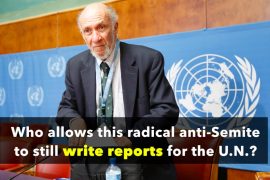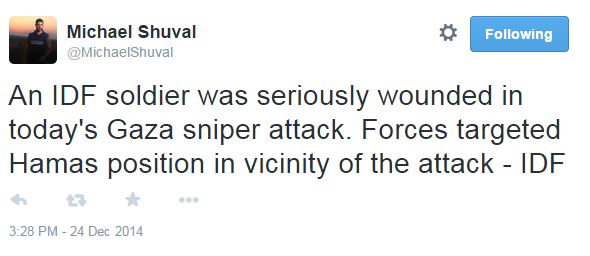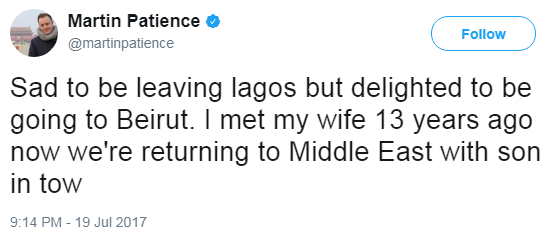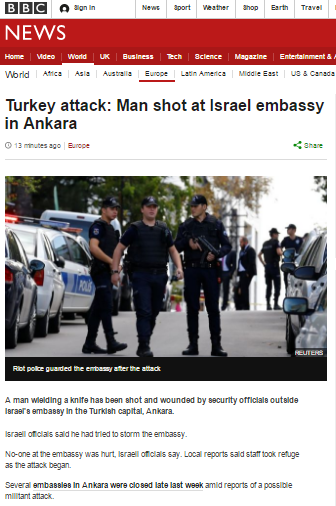As we saw in part one of this post the August 30th afternoon edition of the BBC World Service radio programme ‘Newshour‘ led with a very long item described in the synopsis as follows: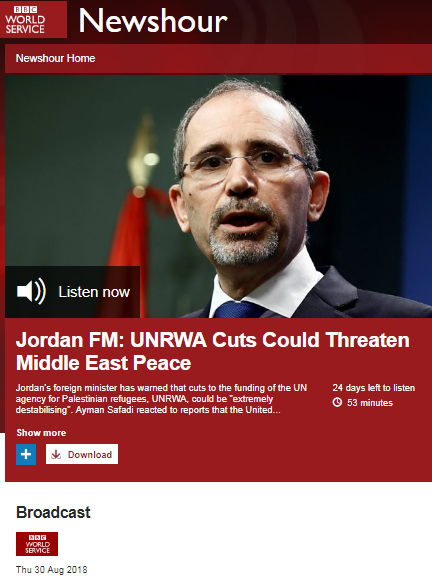
“Jordan’s foreign minister has warned that cuts to the funding of the UN agency for Palestinian refugees, UNRWA, could be “extremely destabilising”. Ayman Safadi reacted to reports that the United States had decided to cut all funding it gives to UNRWA. The US had already announced a big reduction of contributions earlier this year.”
Following an introduction by presenter Julian Marshall and a report from the BBC Jerusalem bureau’s Yolande Knell, Marshall introduced his interviewee (from 04:13 here).
Marshall: “And the head of UNRWA has today been visiting Jordan – home to 2 million Palestinian refugees – where he’s been having talks with the Jordanian foreign minister Ayman Safadi and after that meeting we spoke to Mr Safadi. I asked him first what are his thoughts on UNRWA’s funding crisis.”
Readers may recall that back in May Yolande Knell also interviewed a Jordanian minister on the same topic. Then as now, no effort was made to explain to BBC audiences how that country’s decision to attack the nascent Jewish state in 1948 contributed to the creation of the Palestinian refugee situation.
From 04:31 listeners heard (on a bad phone line) Ayman Safadi claim that UNRWA’s budget deficit “is threatening its ability to continue to offer vital services to over 5 million Palestinian refugees in its 5 areas of operation” and that “failing UNRWA would ultimately translate into depriving 560 million [sic] Palestinian kids from their right to education, millions other from very, very important services that UNRWA provides in terms of health services and other emergency services”.
[05:28] Marshall: “And would you hope that other states will come forward to make up the shortfall?”
Safadi mentioned his country’s role in “putting together the Rome conference” and resulting and subsequent contributions from other countries before claiming that:
Safadi: “It’s not only in terms of financial responsiveness […] but also the political message is that UNRWA is linked to the refugees issue and I think this support we’re seeing translates [into] political support that UNRWA should continue to fulfil its mandate and that the refugees [issue] is a final status issue that should be addressed on the basis of UN resolution.”
Choosing not to expand on the issue of the exploitation of refugees for political leverage, Marshall changed the subject:
Marshall: “Why do you think the United States is doing this?”
Having stated that “we have recognised the logic of the argument the US has made about burden sharing”, Safadi went on to say:
Safadi: “In Jordan we have 122,000 kids that go to UNRWA schools. The pressure therefore is enormous.”
Marshall could at that point have enlightened listeners by asking Safadi why UNRWA is providing services to nearly 2 million people who hold Jordanian citizenship but instead he continued to pursue his previous line of questioning.
[08:44] Marshall: “Ahm…you said that you accepted the US logic about the need for more burden sharing and yet President Trump has made it quite clear in public statements and Tweets that he thinks that the Palestinians are ungrateful and he’s hoping that this might push them back towards the negotiating table.”
Safadi’s response to that question included:
[09:07] Safadi: “There is a humanitarian dimension to UNRWA that cannot be ignored and there’s also a political dimension that also must be emphasised because given the stalemate of the peace process, given the loss of hope, given the despair that has developed as a result of failure to get any traction [on] peace efforts, I think we need to be careful what message we send to the people. To make sure that we send a message of hope, that their livelihoods, their rights, are not forgotten and [unintelligible] to receive due attention by the international community.”
Once again Marshall chose to sidestep the issue of refugees deliberately kept in that status for political reasons. Apparently referring to reports from earlier in the month, he went on to ask:
[10:04] Marshall: “Has the United States discussed with Jordan at all the possibility of giving the money directly, that it might otherwise given [sic] to UNRWA, to you the Jordanian government to help with your 2 million Palestinian refugees?”
Safadi: “That’s a non-starter for us. That’s an issue that we will never accept again because…”
Marshall: “But has…has the United States proposed it?”
Safadi: “Some ideas have been floated and our answer was – it was probably the shortest conversation – such discussions the answer is no. We cannot do that. That will be a destabilizing factor because that will give the message that the right of refugees are being compromised so that’s something that we will not accept. It is not the right thing to do because it can only destabilise people. It will only send the wrong message about where we’re going. Palestinian refugees are under a UN mandate. That mandate has to continue until the refugees issues is dealt with as a final status issue – again, in accordance with the resolution. Jordan will never step in to shoulder the responsibilities UNRWA is shouldering. That said, I need to just state that over and above the services that UNRWA delivers in Jordan, Jordan is the largest contributor to Palestinian refugees. Our budget, our government budget, includes about $1.7 million that we spend on supporting services to Palestinian refugees in Jordan.”
Safadi repeated his “not the right thing to do” and “destabilising” themes yet again before Marshall closed the interview there – choosing once again to sidestep the important question of why UNRWA – financed as it is by donations sourced from tax-payers in other countries – should have to provide services for some 2 million people who – remarkably – audiences were not informed throughout this whole 11 minute long item are actually Jordanian citizens.
This interview with a senior minister from a country where some 40% of UNRWA clients live could obviously have been employed to provide BBC audiences with much-needed enhancement of understanding of the background to the ‘UNRWA in financial crisis’ story that the BBC has been reporting since January. Unsurprisingly given the corporation’s record on this story, once again that opportunity was passed up.
Related Articles:
An eleven minute BBC WS report on UNRWA funding – part one
BBC News reporting on US aid cut to UNRWA – part one
BBC News reporting on US aid cut to UNRWA – part two
BBC News report on US aid cut excludes relevant context
BBC’s special report on Palestinian refugees avoids the real issues

